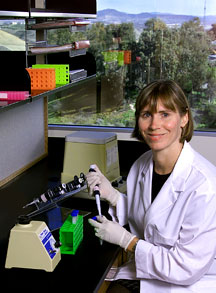

 |  |
New Institute Within TSRI Focuses on Molecular Genetics of Disease--Researchers Target Illnesses of Children and Afflictions of People in Developing Nations-- By Mika Ono With the opening of a brand-new, 54,000-square-foot building on the east side of The Scripps Research Institute (TSRI) campus last month, the idea of the Institute for Childhood and Neglected Diseases (ICND) became a reality. The ICND will act as an umbrella group within TSRI for young scientists working in areas relevant to childhood diseases (such as mental disorders and cystic fibrosis) and diseases (such as malaria and schistosomiasis) that primarily afflict people in developing countries. “The ICND represents a whole new effort for TSRI in the molecular genetics of disease,” says Cell Biology Professor Steve Kay, PhD, who has been organizing the initiative. "The ICND will focus on combining genetic analysis with the new tools of genomics under development by private industry. The potential for synergy is phenomenal." Six faculty, four new to TSRI, will open the ICND: •Assistant Professor Colin Fletcher (AB, Dartmouth College; PhD,
The Rockefeller University), who investigates the genetics of the locomotor
disorders—work relevant to childhood epilepsy and familial forms
of migraines and ataxia. Fletcher arrives at TSRI from the National Cancer
Institute's Frederick Cancer Research and Development Center. The concept of the ICND grew out of conversations in 1996 and 1997 among TSRI President Richard Lerner, John Moores, who was interested in supporting research on illnesses affecting people in developing countries, and the brothers Bernard and Marc Chase, who were interested in supporting research on childhood diseases. John and Rebecca Moores, Bill Bauce, and other automobile enthusiasts donated a number of vintage automobiles, which were auctioned to support the initiative. The Moores went on to contribute a valuable coin collection, as well as pledging $5 million over five years. The Chase brothers also made a donation to the effort. In 1999, Lerner, Kay, and Professor Peter Schultz met to begin detailing
the scientific aspects of the ICND, which was conceived in three phases: Throughout all phases, collaborations with the The Genomics Institute of the Novartis Research Foundation (GNF) and other private institutions will be set up as needed. "The ICND is a far-reaching project that is immensely appropriate for an institution of TSRI’s stature," comments Kay. "With the ICND, TSRI is making a significant commitment to translating the letters of the Human Genome Project into prose that will benefit mankind."
|
 Assistant Professor Elizabeth Winzeler, whose research focuses on finding ways to select promising proteins to target in the malaria parasite, is one of six faculty to open the ICND.
| |